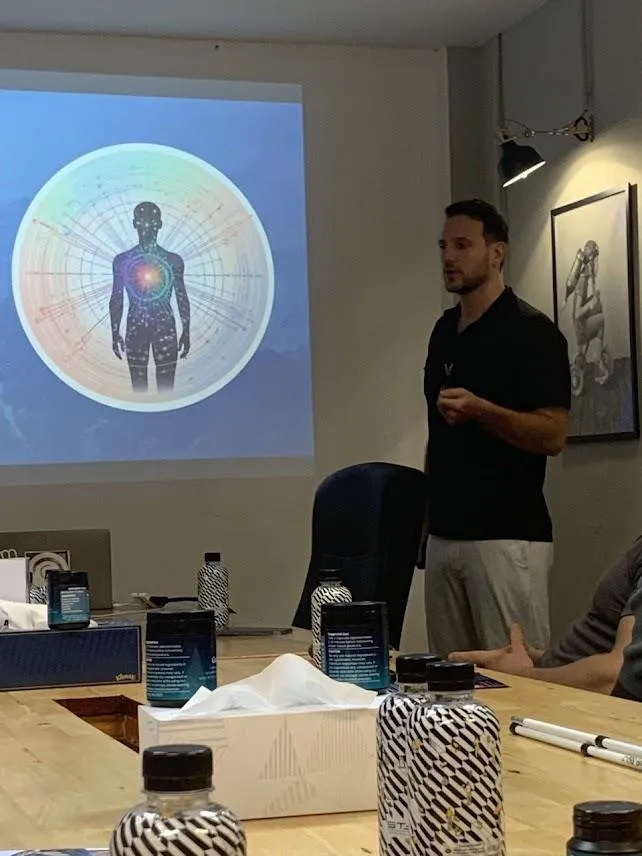Do you have a calling?
Are you looking for yourself?
Henosis is founded upon the idea that every human being in unique and has a purpose. You have aspects that make you so different to every other human on the planet, yet such deep similarities that show we're all the same.
Origin Story of Henosis
The Greek word henosis refers to the process of achieving a state of oneness or unity with the divine. This concept has been central to many mystical and philosophical traditions throughout history, particularly in ancient Greece.
The term henosis comes from the Greek word ἕνωσις, which means "union" or "merging." It was used by several ancient Greek philosophers, including Plotinus and Proclus, to describe the goal of mystical practice.
For these philosophers, the goal of mystical practice was to transcend the limitations of the physical world and achieve a direct experience of the divine.
This experience was seen as a merging or union with the divine, a state of consciousness in which the individual and the divine were no longer separate entities but were united as one.
In some mystical traditions, henosis was seen as a gradual process of spiritual development, in which the individual gradually purifies their mind and body and becomes more attuned to the divine. In others, it was seen as a sudden, spontaneous experience that could occur at any time.
The concept of henosis was also central to many ancient Greek religious practices, particularly in the mystery religions. These were secretive, initiatory cultures that focused on the direct experience of the divine through ritual practices, often involving ecstatic states of consciousness.
Henosis has also been an important concept in the history of Christianity, particularly in the Eastern Orthodox tradition. In this tradition, henosis is seen as the ultimate goal of spiritual practice, a state of union with God that is achieved through prayer, contemplation, and asceticism.

Overall, the concept of henosis is a complex and multifaceted one that has played a central role in many mystical and philosophical traditions throughout history. Whether seen as a gradual process of spiritual development or a sudden, spontaneous experience, it represents the human longing for a direct experience of the divine, and the recognition that this experience lies at the heart of our deepest aspirations and desires.

HENOSIS PURPOSE
Henosis was formed to hold space for the lost soul, questioning their current reality, and to provide alternative information and experiences that may serve as the launching pad for their new life.

HENOSIS VISION
We believe that all humans deserve to live a life of fulfillment and to participate in the raising of the vibrational frequency of earth to expand consciousness.

HENOSIS MISSION
Henosis assists with the shedding of our limiting beliefs, overcoming our emotional and energetic blocks and reprogramming harmful habits and biases. We develop educational information, events and activities to promote ancient wisdom, alternative medicines, new age science and holistic healing modalities to empower the individual to discover their own limitless possibilities and increase awareness.
What the greats say about Henosis over Millenia
Within the word henosis lies a powerful invitation to experience the unity and oneness that exists within and around us, to dissolve the illusion of separateness and awaken to the truth of our interconnectedness with all of life.
Plato
Henosis is the transcendence of the self, the merging of the individual with the divine, and the attainment of spiritual enlightenment.
Eckhart Tolle
The experience of henosis is a mystical journey, a quest for the ultimate truth and the ultimate reality.
Carl Jung
In the state of henosis, the individual ego dissolves into the infinite, and the soul merges with the divine.
Deepak Chopra
Henosis is the realisation that we are all interconnected, that we are all part of a greater whole, and that we are all one.
Alan Watts
In the state of henosis, the boundaries between self and other dissolve, and the individual becomes one with the universe and all that exists.
Sri Ramana Maharshi
Henosis is the state of being in which one transcends the limitations of the ego and realises the true nature of the self as part of the divine.
Buddha
Henosis is the ultimate liberation, the release from the bonds of the ego and the attainment of eternal bliss and peace.
Henosis
Henosis represents the journey of transcending individuality, merging with the divine, and awakening to the unity that connects all of existence.
Interested in changing your life?
Check out some of our free articles
HEALTH & WELLBEING

Psychedelic-assisted Therapy available in Australia July 1, 2023
A significant development in the field of mental health treatment has emerged, as the Therapeutic Goods Administration (TGA) in Australia has announced that from 1 July, certain medicines containing psilocybin and MDMA can be prescribed by authorised psychiatrists and Psychedelic-assisted Therapy can now be accessed in Australia. The decision comes as a response to the growing evidence proving benefits of these substances in treating specific mental health conditions. While prescribing will be limited to psychiatrists with the necessary qualifications and expertise, this decision opens new possibilities for individuals facing depression and other treatment-resistant mental illnesses. However, strict controls and regulations are still in place.
What does Psychedelic-assisted therapy mean for the public?
For the public, this decision represents a significant step forward in mental health treatment options. Until now, patients suffering from conditions such as post-traumatic stress disorder (PTSD) and treatment-resistant depression have had limited treatment choices. With the introduction of psilocybin and MDMA as potential therapies, individuals who have not responded well to conventional treatments now have the opportunity to explore alternative approaches.
However, it is essential to note that these medicines will be accessible only through specialised psychiatrists and within a controlled medical setting. This ensures that the administration and monitoring of these substances occur under expert guidance, minimising risks and maximising potential benefits. The public should be aware that these medicines are still classified as prescription-only, meaning they cannot be advertised or promoted to the general public.
What does Psychedelic-assisted therapy mean for individuals facing depression?
For individuals facing depression, particularly those who have not found relief from traditional treatments, the availability of psilocybin as a potential therapy brings new hope. Treatment-resistant depression can be debilitating, and the introduction of psilocybin offers an alternative path.
Psychedelic-assisted therapy, guided by trained psychiatrists, aims to provide a transformative and healing experience for patients. Psilocybin has shown in clinical trials to be a catalyst for self-reflection, emotional breakthroughs, and alleviation of depressive symptoms. By working in conjunction with therapy, psilocybin helps individuals gain new perspectives and address underlying causes of their depression.
It is important to emphasize that these treatments will be conducted within controlled settings, prioritizing patient safety. Patients should consult with their psychiatrists to determine whether psilocybin-assisted therapy is a suitable option for their specific circumstances.
What does Psychedelic-assisted therapy mean for psychiatrists?
For psychiatrists, the TGA's decision acknowledges their expertise and ability to diagnose and treat patients with serious mental health conditions. Prescribing psilocybin and MDMA will be restricted to authorised psychiatrists, ensuring that these treatments are administered by professionals who possess the necessary qualifications and have undergone approval processes.
Psychiatrists who wish to prescribe these substances must first obtain approval from a human research ethics committee (HREC) registered with the National Health and Medical Research Council (NHMRC). Subsequently, they must seek authorisation from the TGA under the Authorised Prescriber Scheme (AP scheme) to prescribe psilocybin for treatment-resistant depression and MDMA for post-traumatic stress disorder.
This decision presents psychiatrists with an opportunity to explore new treatment avenues and expand their therapeutic approaches. It also highlights the importance of ongoing research and professional development in the field of mental health, as new evidence and treatment modalities continue to emerge.
Conclusion on Psychedelic-assisted therapy:
The TGA's decision to allow authorised psychiatrists to prescribe medicines containing psilocybin and MDMA for specific mental health conditions is a groundbreaking development. For the public, it offers new possibilities in mental health treatment, particularly for individuals facing treatment-resistant depression and PTSD. However, it is crucial to remember that these treatments will be conducted under controlled medical settings, ensuring patient safety and minimising potential risks. Psychedelic-assisted therapy can provide individuals with transformative experiences and offer a fresh perspective on their mental health challenges.
Sources: If you are interested in reading further into the studies behind Psychadelic-asstsed Therapy, please see the following. These studies are showing an estimated 80% effectivity rate over long-term (6 months+) for measurable improvement in happiness after only a few doses.
Hendricks, P. S., Johnson, M. W., & Griffiths, R. R. (2015). Psilocybin, psychological distress, and suicidality. Journal of Psychopharmacology, 29(9), 1041-1043.
Carhart-Harris, R. L., Bolstridge, M., Rucker, J., et al. (2016). Psilocybin with psychological support for treatment-resistant depression: an open-label feasibility study. The Lancet Psychiatry, 3(7), 619-627.
Griffiths, R. R., Johnson, M. W., Carducci, M. A., et al. (2016). Psilocybin produces substantial and sustained decreases in depression and anxiety in patients with life-threatening cancer: A randomized double-blind trial. Journal of Psychopharmacology, 30(12), 1181-1197.
PSYCHOLOGY

Psychedelic-assisted Therapy available in Australia July 1, 2023
A significant development in the field of mental health treatment has emerged, as the Therapeutic Goods Administration (TGA) in Australia has announced that from 1 July, certain medicines containing psilocybin and MDMA can be prescribed by authorised psychiatrists and Psychedelic-assisted Therapy can now be accessed in Australia. The decision comes as a response to the growing evidence proving benefits of these substances in treating specific mental health conditions. While prescribing will be limited to psychiatrists with the necessary qualifications and expertise, this decision opens new possibilities for individuals facing depression and other treatment-resistant mental illnesses. However, strict controls and regulations are still in place.
What does Psychedelic-assisted therapy mean for the public?
For the public, this decision represents a significant step forward in mental health treatment options. Until now, patients suffering from conditions such as post-traumatic stress disorder (PTSD) and treatment-resistant depression have had limited treatment choices. With the introduction of psilocybin and MDMA as potential therapies, individuals who have not responded well to conventional treatments now have the opportunity to explore alternative approaches.
However, it is essential to note that these medicines will be accessible only through specialised psychiatrists and within a controlled medical setting. This ensures that the administration and monitoring of these substances occur under expert guidance, minimising risks and maximising potential benefits. The public should be aware that these medicines are still classified as prescription-only, meaning they cannot be advertised or promoted to the general public.
What does Psychedelic-assisted therapy mean for individuals facing depression?
For individuals facing depression, particularly those who have not found relief from traditional treatments, the availability of psilocybin as a potential therapy brings new hope. Treatment-resistant depression can be debilitating, and the introduction of psilocybin offers an alternative path.
Psychedelic-assisted therapy, guided by trained psychiatrists, aims to provide a transformative and healing experience for patients. Psilocybin has shown in clinical trials to be a catalyst for self-reflection, emotional breakthroughs, and alleviation of depressive symptoms. By working in conjunction with therapy, psilocybin helps individuals gain new perspectives and address underlying causes of their depression.
It is important to emphasize that these treatments will be conducted within controlled settings, prioritizing patient safety. Patients should consult with their psychiatrists to determine whether psilocybin-assisted therapy is a suitable option for their specific circumstances.
What does Psychedelic-assisted therapy mean for psychiatrists?
For psychiatrists, the TGA's decision acknowledges their expertise and ability to diagnose and treat patients with serious mental health conditions. Prescribing psilocybin and MDMA will be restricted to authorised psychiatrists, ensuring that these treatments are administered by professionals who possess the necessary qualifications and have undergone approval processes.
Psychiatrists who wish to prescribe these substances must first obtain approval from a human research ethics committee (HREC) registered with the National Health and Medical Research Council (NHMRC). Subsequently, they must seek authorisation from the TGA under the Authorised Prescriber Scheme (AP scheme) to prescribe psilocybin for treatment-resistant depression and MDMA for post-traumatic stress disorder.
This decision presents psychiatrists with an opportunity to explore new treatment avenues and expand their therapeutic approaches. It also highlights the importance of ongoing research and professional development in the field of mental health, as new evidence and treatment modalities continue to emerge.
Conclusion on Psychedelic-assisted therapy:
The TGA's decision to allow authorised psychiatrists to prescribe medicines containing psilocybin and MDMA for specific mental health conditions is a groundbreaking development. For the public, it offers new possibilities in mental health treatment, particularly for individuals facing treatment-resistant depression and PTSD. However, it is crucial to remember that these treatments will be conducted under controlled medical settings, ensuring patient safety and minimising potential risks. Psychedelic-assisted therapy can provide individuals with transformative experiences and offer a fresh perspective on their mental health challenges.
Sources: If you are interested in reading further into the studies behind Psychadelic-asstsed Therapy, please see the following. These studies are showing an estimated 80% effectivity rate over long-term (6 months+) for measurable improvement in happiness after only a few doses.
Hendricks, P. S., Johnson, M. W., & Griffiths, R. R. (2015). Psilocybin, psychological distress, and suicidality. Journal of Psychopharmacology, 29(9), 1041-1043.
Carhart-Harris, R. L., Bolstridge, M., Rucker, J., et al. (2016). Psilocybin with psychological support for treatment-resistant depression: an open-label feasibility study. The Lancet Psychiatry, 3(7), 619-627.
Griffiths, R. R., Johnson, M. W., Carducci, M. A., et al. (2016). Psilocybin produces substantial and sustained decreases in depression and anxiety in patients with life-threatening cancer: A randomized double-blind trial. Journal of Psychopharmacology, 30(12), 1181-1197.
HAPPINESS

Psychedelic-assisted Therapy available in Australia July 1, 2023
A significant development in the field of mental health treatment has emerged, as the Therapeutic Goods Administration (TGA) in Australia has announced that from 1 July, certain medicines containing psilocybin and MDMA can be prescribed by authorised psychiatrists and Psychedelic-assisted Therapy can now be accessed in Australia. The decision comes as a response to the growing evidence proving benefits of these substances in treating specific mental health conditions. While prescribing will be limited to psychiatrists with the necessary qualifications and expertise, this decision opens new possibilities for individuals facing depression and other treatment-resistant mental illnesses. However, strict controls and regulations are still in place.
What does Psychedelic-assisted therapy mean for the public?
For the public, this decision represents a significant step forward in mental health treatment options. Until now, patients suffering from conditions such as post-traumatic stress disorder (PTSD) and treatment-resistant depression have had limited treatment choices. With the introduction of psilocybin and MDMA as potential therapies, individuals who have not responded well to conventional treatments now have the opportunity to explore alternative approaches.
However, it is essential to note that these medicines will be accessible only through specialised psychiatrists and within a controlled medical setting. This ensures that the administration and monitoring of these substances occur under expert guidance, minimising risks and maximising potential benefits. The public should be aware that these medicines are still classified as prescription-only, meaning they cannot be advertised or promoted to the general public.
What does Psychedelic-assisted therapy mean for individuals facing depression?
For individuals facing depression, particularly those who have not found relief from traditional treatments, the availability of psilocybin as a potential therapy brings new hope. Treatment-resistant depression can be debilitating, and the introduction of psilocybin offers an alternative path.
Psychedelic-assisted therapy, guided by trained psychiatrists, aims to provide a transformative and healing experience for patients. Psilocybin has shown in clinical trials to be a catalyst for self-reflection, emotional breakthroughs, and alleviation of depressive symptoms. By working in conjunction with therapy, psilocybin helps individuals gain new perspectives and address underlying causes of their depression.
It is important to emphasize that these treatments will be conducted within controlled settings, prioritizing patient safety. Patients should consult with their psychiatrists to determine whether psilocybin-assisted therapy is a suitable option for their specific circumstances.
What does Psychedelic-assisted therapy mean for psychiatrists?
For psychiatrists, the TGA's decision acknowledges their expertise and ability to diagnose and treat patients with serious mental health conditions. Prescribing psilocybin and MDMA will be restricted to authorised psychiatrists, ensuring that these treatments are administered by professionals who possess the necessary qualifications and have undergone approval processes.
Psychiatrists who wish to prescribe these substances must first obtain approval from a human research ethics committee (HREC) registered with the National Health and Medical Research Council (NHMRC). Subsequently, they must seek authorisation from the TGA under the Authorised Prescriber Scheme (AP scheme) to prescribe psilocybin for treatment-resistant depression and MDMA for post-traumatic stress disorder.
This decision presents psychiatrists with an opportunity to explore new treatment avenues and expand their therapeutic approaches. It also highlights the importance of ongoing research and professional development in the field of mental health, as new evidence and treatment modalities continue to emerge.
Conclusion on Psychedelic-assisted therapy:
The TGA's decision to allow authorised psychiatrists to prescribe medicines containing psilocybin and MDMA for specific mental health conditions is a groundbreaking development. For the public, it offers new possibilities in mental health treatment, particularly for individuals facing treatment-resistant depression and PTSD. However, it is crucial to remember that these treatments will be conducted under controlled medical settings, ensuring patient safety and minimising potential risks. Psychedelic-assisted therapy can provide individuals with transformative experiences and offer a fresh perspective on their mental health challenges.
Sources: If you are interested in reading further into the studies behind Psychadelic-asstsed Therapy, please see the following. These studies are showing an estimated 80% effectivity rate over long-term (6 months+) for measurable improvement in happiness after only a few doses.
Hendricks, P. S., Johnson, M. W., & Griffiths, R. R. (2015). Psilocybin, psychological distress, and suicidality. Journal of Psychopharmacology, 29(9), 1041-1043.
Carhart-Harris, R. L., Bolstridge, M., Rucker, J., et al. (2016). Psilocybin with psychological support for treatment-resistant depression: an open-label feasibility study. The Lancet Psychiatry, 3(7), 619-627.
Griffiths, R. R., Johnson, M. W., Carducci, M. A., et al. (2016). Psilocybin produces substantial and sustained decreases in depression and anxiety in patients with life-threatening cancer: A randomized double-blind trial. Journal of Psychopharmacology, 30(12), 1181-1197.

